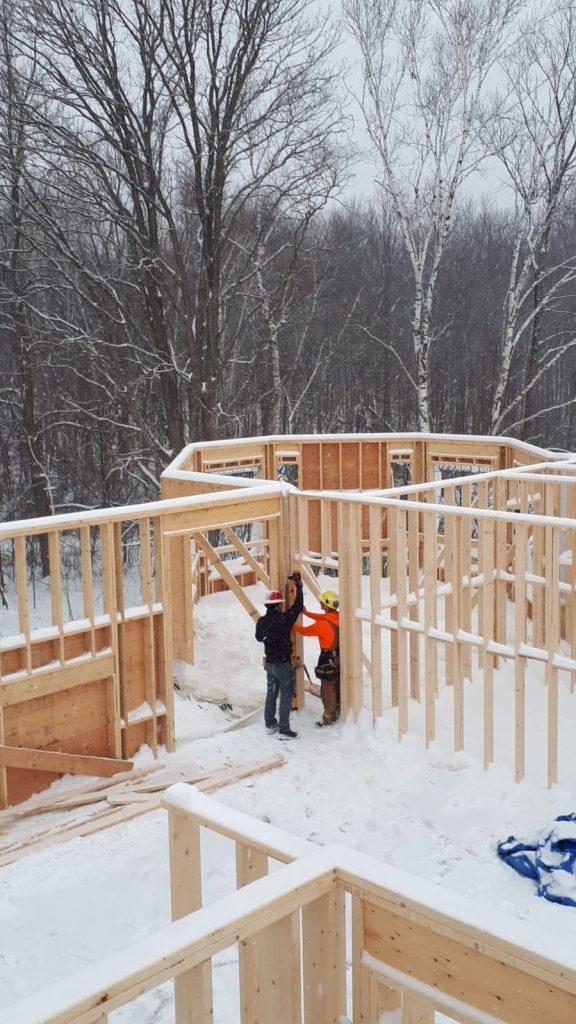Working with Experienced Professionals Gets the Best Results for Your Custom Home
You’ve probably heard a few horror stories about unreliable general contractors. Unfortunately, there are plenty of good people who’ve had bad experiences working with so-called “experts.” The good news is that most custom home builders aren’t cut from this cloth and share a passion for helping their clients bring their vision to life.
Ask anyone on the Sunter Homes team, and you’ll quickly learn that the contractor community is incredibly supportive and strives to go above and beyond for their clients. We all share a passion for this work, after all, and we love helping our clients make their home their own.
If you’re still cautious about contractors, consider the alternative: the DIY route. Even if you’re pretty handy on your own, and have completed a few renovations in the past, you’re probably not ready to try to build your own house.

Do You Need to Work with Contractors?
As tempting as it is to handle construction on your own, yes, you should absolutely work with contractors to build your own house.
There are plenty of reasons why you should hire experienced custom home builders for this, but really, they all boil down to the fact that these people do this professionally. At the end of the day, unless you’re a contractor yourself, it’s a lot to handle, even if you’ve got renovating and woodworking experience.
For example, even if you’re comfortable working with bathroom plumbing or laying tiles, there’s a lot more work that needs to go into a home. Insulation, foundations, wiring for lighting, and space for furnaces and plumbing… at some point, you’re going to need a helping hand.
If you’re simply looking for a more hands-on experience and want to get involved, most contractors should be able to accommodate that. But consider how large-scale a home is. Let the pros handle it!
Working With Pros for Renovations
This is where the DIY approach becomes a bit more viable.
Of course, you may still need to hire contractors for certain jobs, such as electrical wiring or HVAC installation. In these cases, it’s worth it.
Finding Contractors That “Get It”
So you’re ready to work with contractors, but don’t quite know where to start.
You’re going to have to do a bit of research. This includes browsing the Internet, looking for contractors whose work you admire (check out their portfolios online), and reaching out via email or phone to get a conversation started.
Of course, one of the best ways to find contractors who are genuinely great to work with is to ask around. If you know friends or family nearby who’ve had a good experience, ask if they’d make an introduction or recommendation. If this isn’t an option, turn to online reviews! These are fantastic ways to check out a contractor’s reputation. You’re getting genuine, honest opinions from people who’ve worked with them.
Look for examples of work you really enjoy and check out what contractors have to say about their work. Explore the team pages on their website to get a sense of their skills and passions, and find the people who “get” your vision. This will mean reaching out and getting in touch, though, which brings us to the next step.
Once you’ve found a few contractors you think would be a good fit, get in touch, and get your questions ready. This is, quite literally, their job interview, so it’s the best time to get as much information as you can.
Questions to Ask Potential Contractors
What are your qualifications?
This is the big one. You don’t need to be this up front, of course; ask them how long they’ve been in business, how they got started, how their company operates, and about past work. Their qualifications should also include memberships in professional organizations, licenses for their staff, and a few details about insurance and liability. Memberships in regulated professional associations and organizations is a good sign that your contractor is reputable and reliable.
What services do you offer?
When you’re interviewing potential contractors, ask them about their services. You may be surprised at some of the work they include as part of their services; for example, at Sunter Homes, we work with award-winning designers but are equally comfortable if you bring your own design.

We also have plenty of experience with custom carpentry. Other contractors have other strengths and areas of focus, even if you’re “just” looking for someone to build your home. This can also help identify red flags—for example, they do basements and living rooms but have never done a kitchen.
Could I talk to some of your past clients?
Closely related to browsing their portfolio, asking about past clients should be a positive experience. You’re looking for more information about happy clients, and most contractors will jump at the opportunity to show you more of their work and have happy clients speak highly about them. You could even ask to visit a current project to get a sense of their work process and abilities. You’re basically checking their references at this point and doing your due diligence before you entrust your home with a stranger.
What is your ballpark estimate for this project?
Your contractors should be comfortable enough to offer a rough estimate of costs with a project based on initial meetings. Keep in mind this is only a rough estimate; if you want something more concrete, it’s best to get it in writing as part of the quoting process, which may have a fee attached.
Will we get a written contract?
A written contract will set out the agreement between you and your contractors. It will include the agreed-upon prices and costs discussed with your contractor during their quoting process. If a contractor answers NO to this question, walk away. Without a contract, you have no proof you and your contractor agreed to anything, and you should not let anyone proceed with work on your home.
Do you offer a warranty?
Reputable and reliable contractors provide warranties. For example, Sunter Homes offers a two-year warranty on all our work. We offer a complimentary inspection and follow-up 30 days after we’ve finished work on your space, and another at the 1-year anniversary of completion. Renovators and home builders should stand behind their work, and if they’re not willing to deliver on the quality you expect, you should look elsewhere.
Of course, once you’ve got the information you need, the biggest question is, “When can you get started?”

Developing a Good Working Relationship
The key to a truly beneficial relationship with your contractor is communication.
This doesn’t mean you should hover over them at the job site, call them non-stop to second-guess their work, or otherwise pick apart decisions and details. You’re not paying to be a jerk, after all.
It does mean that you should establish boundaries and protocols for any potential issues that may arise. For example, before calling your contractor at 10 o’clock at night when they’re off the clock and spending time with their family, establish some agreed-upon times that you can reach out with questions or comments.
This goes both ways: you might not want to be interrupted during your day at work unless it’s a major emergency. You’ll also likely want some contingencies or secondary contacts who can answer questions on your behalf (your partner or spouse, most likely) and someone you can reach out to if your lead contractor is busy.
At Sunter Homes, we definitely get how important it is for our clients to visit the job site and see progress. We also work hard to stay accountable to our clients and try and schedule regular meetings to keep you apprised of your home’s development. In fact, in our experience, you’ll likely be calling us less often than we call you! Your satisfaction is always our primary concern.
Bringing Your Vision For Your Home to Life
Finding a reliable contractor or custom home builder isn’t as challenging as the scary stories might have you believe. Most contractors will work to support your vision and help you bring it to life, but it’s important to remember that the process is a two-way street.
Developing an effective working relationship starts with asking questions and setting expectations. With a bit of planning, research, and careful consideration, you can find a stellar contractor to build your house to your exact specifications. Plus, you’ll find one who’ll make the process as smooth and stress-free as possible, ensuring your every need is met and that you’re left with an amazing home that’ll stand the test of time.
